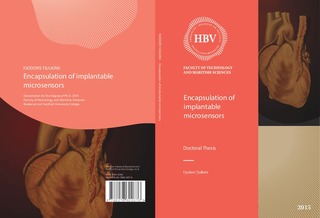Encapsulation of implantable microsensors
Doctoral thesis
Permanent lenke
http://hdl.handle.net/11250/2368511Utgivelsesdato
2015Metadata
Vis full innførselSamlinger
Sammendrag
Heart function monitoring by attaching an accelerometer directly to the heart ventricle has been established as an effective way of diagnosing ischemia. The method holds a number of advantages over conventional monitoring techniques: high specificity and accuracy surpassing that of electrocardiography, and the ability to conduct non-stop monitoring unlike x-ray imaging. To this date, the drawback has been that the accelerometer-based devices have been too large to be used in the postoperative period, when the patient’s chest is closed. This period is of great interest. The PhD project has focused on developing a heart monitoring device intended
to be used on patients recovering from a Coronary Artery Bypass Graft. The device is
intended to be used during surgery and for the subsequent recovery period (3-5 days).
The project has employed commercial 3-axis accelerometers. This PhD project has contributed to four different generations of devices, each
one featuring incremental improvements. The first generation validated the concept,
the second outlined the form factor of the device, and the third added extra
functionality and revised the form of the implant. The fourth generation device also
featured a newer, more compact sensor, which in turn, allowed to further miniaturize
the device and evaluate different implant shapes. This evolutionary approach allowed
us to formulate testing methodology for the devices. The latest generation devices
underwent tests of: leakage current according to IEC60601 standard (current below
0.01 mA), including after cyclical loading of the capsule-cable joint, pull-out force
measurements, implant stability evaluation that yielded tilt of no more than 4 degrees.
Består av
Article I: F. Tjulkins, A. T. T. Nguyen, N. Hoivik, K. Aasmundtveit, E. Andreassen, L. Hoff, K. Imenes, "3-axisMEMS Accelerometer-based Implantable Heart Monitoring System with Novel Fixation Method," in Electronic Components & Technology Conference, Las Vegas Cosmopolitan, 2013, pp. 510–516.Article II: F. Tjulkins, A. T. T. Nguyen, N. Hoivik, K. Aasmundtveit, E. Andreassen, L. Hoff, O. J. Grymyr, P. S. Halvorsen, K. Imenes, "MEMS-Based Implantable Heart Monitoring System with Integrated Pacing Function," in Electronic Components & Technology Conference, Orlando, Florida, 2014, pp. 139-144.
Article III: F. Tjulkins, A T. T. Nguyen, E. Andreassen, K. Aasmundtveit, N. Hoivik, L. Hoff, , O. J. Grymyr, P. S. Halvorsen, K. Imenes, "Fabrication and assembly of MEMS accelerometer-based heart monitoring device with simplified, one step placement," J Med Eng Technol, vol. 39, pp. 69-74, Jan 2015.
Article IV: F. Tjulkins, A. T. T. Nguyen, E. Andreassen, L. Hoff, P. S. Halvorsen, O. J. Grymyr, K. Imenes “An Implantable Accelerometer-based Heart Monitoring Device with Improved Positional Stability” submitted to ASME Journal of Medical Devices.
